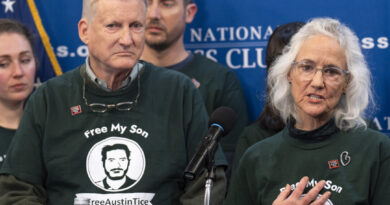Supreme Court to Review Case Regarding Ban on Gender-Related Procedures for Minors
The case raises the question of whether Tennessee’s ban infringes upon the equal protection clause stipulated in the 14th Amendment.
On December 4, the U.S. Supreme Court is set to hear a pivotal case regarding gender that may explore the contentious array of evidence concerning medical care for gender identity and its impact on state legislation.
Prominent medical organizations endorse these procedures, asserting they alleviate the distress experienced by children who perceive a disconnect between their gender identity and biological sex. Conversely, opponents, including conservative factions and state authorities like Tennessee’s, argue that the evidence regarding the safety and efficacy of these treatments is ambiguous or denotes potential harm to children.
“Our goal was to maintain a compelling state interest aimed at protecting children, which we achieve through various means,” remarked Tennessee Senate Majority Leader Jack Johnson, a sponsor of the law, to The Epoch Times. In contrast, U.S. Solicitor General Elizabeth Prelogar stated that laws similar to Tennessee’s obstruct “medically necessary care” and heighten the risk of suicidal ideation.
In accepting this case, the Supreme Court is set to address a fundamentally legal question, specifically whether the law contravenes the Equal Protection Clause of the 14th Amendment, rather than making determinations about the efficacy of the procedures in question.
During this four-year span, nearly 15,000 minors with a prior diagnosis of gender dysphoria began using hormones, which impact secondary sex characteristics such as fat distribution. In total, 17,683 individuals aged 6–17 with a previous diagnosis initiated treatment with either puberty blockers or hormones during this timeframe.
Levels of Scrutiny
Alliance Defending Freedom’s Vice President of Appellate Advocacy, John Bursch, articulated to The Epoch Times that the Supreme Court is confronting legal questions that “shouldn’t necessitate an assessment of evidence.”
“Courts should either defer to state legislative decisions regarding medical practices or they should not,” he explained. However, he speculated that it is “highly likely” the justices will consider the scientific evidence presented in this case.
Prelogar is urging the court to evaluate if Tennessee’s law violates the 14th Amendment, which has been scrutinized under varying levels of judicial review for state statutes.
The majority opinion asserted that rational basis did not necessitate a debate over evidence, stating, “Even when considering the evidence presented during the preliminary injunction hearing, Kentucky and Tennessee offered substantial evidence regarding the risks associated with these treatments and the shortcomings of the existing research.”
It further noted, “The unsettled and evolving, essentially still experimental, nature of treatments in this domain justifies multiple policy approaches, and the Constitution does not prioritize one over another.”
Prelogar contended that the law ought to undergo heightened scrutiny and subsequently fail under that stricter standard. Dissenter Sixth Circuit Judge Helen White concurred, asserting that the law warranted a higher level of scrutiny and that the statutes in question “lack[ed] an overwhelmingly persuasive justification.”
The Evidence
Tennessee Attorney General Jonathan Skrmetti argued in his brief to the Supreme Court that the law could withstand any level of scrutiny. “Tennessee’s law serves governmental interests that are not merely significant, but compelling,” he stated, referencing the contrasting levels of governmental interest used in evaluating laws.
The law’s “prohibition on these hazardous and possibly irreversible medical interventions for minors is substantially related to achieving its objectives,” he asserted, further claiming that the evidence does not substantiate claims regarding the advantages of these treatments.
A large contingent of medical organizations, including the American Academy of Pediatrics (AAP) and the American Medical Association, submitted an amicus brief in September that joined others in asserting that “affirming care” is beneficial and aids in preventing distress.
In contrast, Tennessee and other critics have expressed skepticism regarding the evidential foundation of those recommendations.
Harms
Critics also emphasize statements from the Endocrine Society and the World Professional Association for Transgender Health (WPATH) regarding the evidence available and potential risks to young individuals.
The AAP and other organizations asserted in their brief that “puberty blockers can facilitate easier transitions later in life, as they prevent irreversible bodily changes like breast development or the protrusion of the Adam’s apple.”
The AAP and affiliated organizations have stressed the necessity of professional oversight in managing an incremental approach to these procedures to mitigate potential adverse effects.





